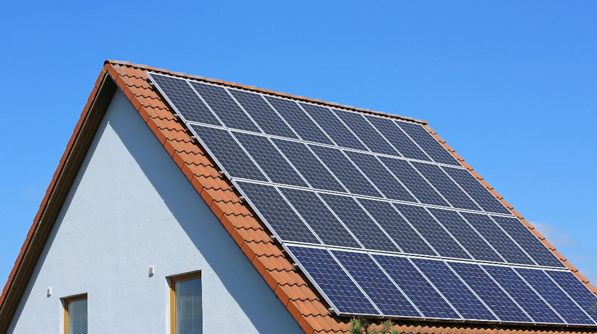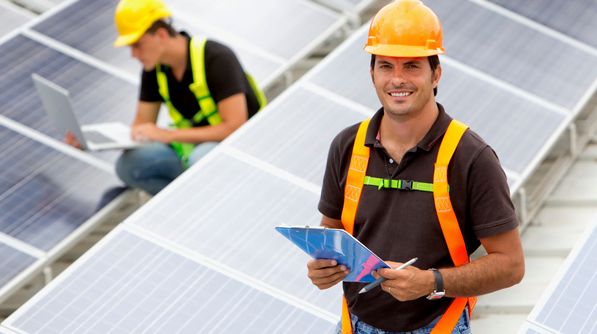Many homeowners and businesses consider solar power solutions as an alternative energy source. This is especially due to the rising energy costs and the long-term sustainability promised. However, before finding the right solar company in Connecticut, property owners should know whether their roofs are good for solar or not.
So, what makes a roof good for solar, and what determines a roof that needs improvement? Here are the four important factors to keep in mind.

Roof angle
Your roof’s angle is perhaps the most important consideration when it comes to solar compatibility. The roof’s orientation can affect the solar panel’s access to sunlight, ultimately affecting its performance. South-facing roofs offer the highest performance index because they maximize exposure to sunlight and deliver improved solar power. If your roof is south-facing, you can rest assured that your solar power system will pay for itself in a shorter time than other roof orientations.
Pro Tip: You can also go solar if your roof is facing due east or west. However, you should be prepared to lose some efficiency in its energy production. In most cases, east or west-facing roofs are 75% less efficient than south-facing roofs. You can beat this inefficiency by installing solar panels on a standalone surface instead of your roof. This can further optimize solar exposure and improve energy generation.
You can also benefit from solar power with flat roofs installed on your property. For flat roofs, ensure the solar panels are elevated to face the south for maximum sunlight exposure.
Roof shade
Another important factor when considering solar installation is shade. A shaded roof will enjoy less solar exposure, which means lower solar panel efficiency. Buildings with trees surrounding them can trim wayward limbs to eliminate shade and increase sunlight exposure. However, buildings shaded by other taller buildings may be at a higher disadvantage.
You stand a chance of paying back the cost of your solar panel faster when the panel isn’t shaded, thus producing energy at optimal capacity.
Contact a solar installation professional if you’re unsure about your roof’s shade or its extent. Contractors can use a tool known as the solar pathfinder to determine the extent of solar exposure and what’s blocking it.
Roof surface
Solar power systems are most efficient and effective when installed in large open spaces. With this in mind, consider your roof and the presence of large uninterrupted spaces. You should also consider the presence of roof structures like skylights, chimneys, vents, dormer windows, and air conditioning units. Learn about Hail Damage to Roofs.
Roof’s Age
Your roof’s age can largely determine its eligibility for solar panel installation. Older roofs are often more fragile and prone to damage. They may be unsuitable for solar panel installations, especially as they may crumble under the weight.
Generally, roofs older than 15 years should not be considered for solar panel installations. It may be worthwhile to consider a roof replacement project first before installing the solar panels. This can guarantee better protection for your property, roof, and solar panel.
What Doesn’t Affect Solar Panel Installation

Solar panel weight
Most property owners are often concerned about solar panel weights and how they can affect their roofs. The truth is solar panels aren’t that heavy. With the right installation, the weight is distributed across the roof’s surface, thus reducing the effect on any single point on your roof.
Roof color
Your solar panel does not rely on the color of your existing roof to generate electricity. Homeowners with strong and relatively new roofs can proceed to install solar panels on them to enjoy alternative, sustainable energy. However, they should ensure that a proper roof inspection and repair are done (if necessary) before the solar panel installation is done.
The Best Roofing For Solar Installation
Is your roof older than 15 years, or is it badly damaged and needs replacement? It is important to consider your future plans for solar installation and how it affects your roof material choices. Below are some of the recommended roofing materials to consider for an excellent solar installation experience.
Composite shingles
Composite shingles are a common roofing material among many homeowners. They are perfect for solar installations because they are sturdy, durable, and easy to work with. In fact, this roof type offers the widest range of options for installers and equipment.
Metal standing seam
Metal roofs are one of the most preferred options when it comes to solar panel installations. Most installers find this roofing material easy to work with, thus reducing labor and installation costs.
Tile
Tile roofs can be made from different materials, including ceramic, clay, synthetic cedar, metal, concrete, and slate. Common in warmer climates, these expensive roofing materials are easy to work with when considering solar panel installations.




